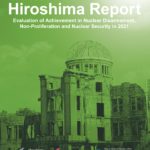Hiroshima Report 2023Introduction (1) Items
In the Hiroshima Report 2023, 78 items ( 41 for nuclear disarmament, 19 for nuclear non -proliferation and 1 18 for nuclear security) are identified for study, analysis and evaluation of the selected countries’ performance, based primarily upon the following documents reflecting widely supported views on the issues of nuclear disarmament, non-proliferation and nuclear security:
➢ The Action Plan and recommendations pertaining to the implementation of the 1995 Middle East resolution contained in the Final Document adopted in the 2010 Nuclear Non-Proliferation Treaty (NPT) Review Conference;
➢ The final draft of a Final Document of the 2015 NPT Review Conference;
➢ The final draft of a Final Document of the 2022 NPT Review Conference;
➢ Seventy-six recommendations contained in the 2009 International Commission on Nuclear Non-Proliferation and Disarmament (ICNND) report titled Eliminating Nuclear Threats: A Practical Agenda for Global Policymakers;
➢ Proposals sponsored or co-sponsored by Japan at the Preparatory Committees for the 2015 NPT Review Conference; and
➢ “Resolution towards the Abolition of Nuclear Weapons” launched by the Mayors for Peace in 2011.
Items were also chosen with the aim of providing a certain degree of objective mea surements for evaluation.
1. Nuclear Disarmament
(1) Status of Nuclear Forces (estimates)
(2) Commitment to Achieving a World without Nuclear Weapons
A) Voting behavior on UN General Assembly (UNGA) resolutions on nuclear disarmament proposals by Japan, New Agenda Coalition ( and Non -Aligned Movement (NAM)
B) Announcement of significant policies and important activities
C) Actions that run counter to nuclear disarmament
(3) Humanitarian consequences of nuclear weapons
A) Voting behavior on UNGA resolutions
B) Participations in joint statements and international conferences
C) Victim assistance and environmental remediation
(4) Treaty on the Prohibition of Nuclear Weapons (TPNW)
A) Signing and ratifying the TPNW
B) Voting behavior on UNGA resolutions on the TPNW
C) Voting behavior on for legally binding UNGA resolutions on prohibition of nuclear weapons
(5) Reduction of Nuclear Weapons
A) Reduction of nuclear weapons
B) Concrete plans for further reduction of nuclear weapons
C) Trends on stren strengthening/ modernizing nuclear weapons capabilities
(6) Diminishing the Roles and Signifi-cance of Nuclear Weapons in National Security Strategies and Policies
A) Current status of the roles and significance of nuclear weapons
B) Commitment to no first use, “sole purpose,” and related doctrines
C) Negative security assurances
D) Voting behavior on UNGA resolutions on legally binding security assurances for NNWS
E) Signing and ratifying the protocols of the treaties on nuclear -weapon-free zones
F) Relying on extended nuclear deterrence
G) Nuclear risk reduction
H) Actions that increases nuclear risk
(7) De-alerting or Measures for Maximizing Decision Time to Authorize the Use of Nuclear Weapons
(8)CTBT
A) Signing and ratifying the CTBT
B) Moratoria on nuclear test explosions pending CTBT’s entry into force
C) Voting behavior on the UNGA resolution on the CTBT
D) Cooperation with the Compre-hensive Nuclear Test-Ban Treaty Organization (CTBTO) Preparatory Commission
E) Contribution to the development of the CTBT verification systems
F) Nuclear testing
(9)FMCT
A) Commitment, efforts, and proposals toward immediate commence commencement of negotiations on an FMCT
B) Voting behavior on the UNGA resolution on an FMCT
C) Moratoria on the production of fissile material for use in nuclear weapons
D) Contribution to the development of verification measures
(10 ) Transparency in Nuclear Forces, Fissile Material for Nuclear Weapons, and Nuclear Strategy/Doctrine
(11) Nuclear Disarmament Verification
A) Acceptance and implementation of nuclear disarmament verification
B) Engagement in research and development for verification measures of nuclear disarmament
C) International Atomic Energy Agency (IAEA) inspections to fissile material declared as no longer required for military purposes
(12) Irreversibility
A) Implementing or planning dismantlement of nuclear warheads and their delivery vehicles
B) Decommissioning/conversion of nuclear weapons-related facilities
C) Measures fo r fissile material declared excess for military purposes, such as disposition or conversion to peaceful purposes
(13) Disarmament and Non-Proliferation Education and Cooperation with Civil Society
(14) Hiroshima and Nagasaki Peace Memorial Ceremonies
2. Nuclear Non-Proliferation
(1) Acceptance and Compliance with Nuclear Non-Proliferation Obligations
A) Accession to the NPT
B) Compliance with Articles I and II of the NPT and the UN Security Council resolutions (UNSCRs) on non -proliferation
C) Nuclear-Weapon -Free Zones
D)Actions that run counter to nuclear non proliferation
(2) IAEA Safeguards Applied to the NPT Non Nuclear Weapon States (NNWS)
A) Signing and ratifying a Compre hensive Safeguards Agreement
B) Signing and ratifying an Additional Protocol
C) Implementation of the integrated safeguards
D) Compliance with IAEA Safe guards Agreement
(3) IAEA Safeguards Applied to NWS and Non Parties to the NPT
A) Application of the IAEA safe guards (Voluntary Offer Agreement or INFCIRC/66) to their peaceful nuclear facilities
B) Signing, ratifying, and implementing the Additional Protocol
(4) Cooperation with the IAEA
A) Cooperation with the IAEA
B) Behaviors impeding IAEA activities
(5) Implementing Appropriate Export Controls on Nuclear Related Items and Technologies
A) Establishment and implementation of the national control systems
B) Requiring the conclusion of the Additional Protocol for nuclear export
C) Implementation of the UNSCRs concerning North Korean and Iranian nuclear issues
D) Participation in the Proliferation Security Initiative ( PSI)
E) Civil nuclear cooperation with non parties to the NPT
(6) Transparency in the Peaceful Use of Nuclear Energy
A) Reporting on the peaceful nuclear activities
B) Reporting on plutonium man-agement
3. Nuclear Security
(1) The Amount of Weapon Usable Nuclear Material and Possession of Relevant Facilities
A) The amount of weapon usable nuclear material
B) Possession of facilities that could cause serious radiological effects
(2) Status of Accession to Nuclear Security and Safety Related Conventions and Their Application to Domestic Systems
A) Convention on the Physical Protection of Nuclear Material and the 2005 Amendment to the Convention
B) International Convention for the Suppression of Acts of Nuclear Terrorism
C) Convention on Nuclear Safety
D) Convention on Early Notification of a Nuclear Accident
E) Joint Convention on the Safety of Spent Fuel Management and on the Safety of Radioactive Waste Management
F) Convention on Assistance in Case of a Nuclear Accident or Radiological Emergency
G) Enactment of laws and establishment of regulations for the national implementation
H) INFCIRC/225/Rev.5
(3) Efforts to Maintain and Improve the Highest Level of Nuclear Security
A) Minimization of highly enriched uranium (HEU) in civilian use
B) Acceptance of international nuclear security review missions
C) Technology development― nuclear forensics
D) Capacity building and support activities
E) IAEA Nuclear Security Plan and Nuclear Security Fund
F) Participation in international efforts
(4) Responding to Nuclear Security Threats Posed by States
A) Commitment to international norms prohibiting attacks against nuclear facilities for peaceful uses, and strengthening of efforts
B) Armed attack against nuclear facilities








